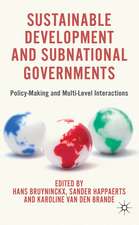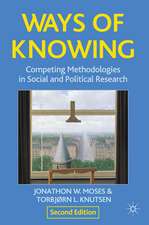Dalit Women's Education in Modern India: Double Discrimination: Routledge Research on Gender in Asia Series
Autor Shailaja Paiken Limba Engleză Paperback – 9 mai 2018
Dalit Women's Education in Modern India is a social and cultural history that challenges the triumphant narrative of modern secular education to analyse the constellation of social, economic, political and historical circumstances that both opened and closed opportunities to many Dalits. By focusing on marginalised Dalit women in modern Maharashtra, who have rarely been at the centre of systematic historical enquiry, Paik breathes life into their ideas, expectations, potentials, fears and frustrations. Addressing two major blind spots in the historiography of India and of the women’s movement, she historicises Dalit women’s experiences and constructs them as historical agents. The book combines archival research with historical fieldwork, and centres on themes including slum life, urban middle classes, social and sexual labour, and family, marriage and children to provide a penetrating portrait of the actions and lives of Dalit women.
Elegantly conceived and convincingly argued, Dalit Women's Education in Modern India will be invaluable to students of History, Caste Politics, Women and Gender Studies, Education Studies, Urban Studies and Asian studies.
| Toate formatele și edițiile | Preț | Express |
|---|---|---|
| Paperback (1) | 392.67 lei 6-8 săpt. | |
| Taylor & Francis – 9 mai 2018 | 392.67 lei 6-8 săpt. | |
| Hardback (1) | 1172.34 lei 6-8 săpt. | |
| Taylor & Francis – 8 iul 2014 | 1172.34 lei 6-8 săpt. |
Din seria Routledge Research on Gender in Asia Series
-
 Preț: 394.83 lei
Preț: 394.83 lei - 18%
 Preț: 952.31 lei
Preț: 952.31 lei - 12%
 Preț: 325.34 lei
Preț: 325.34 lei -
 Preț: 389.66 lei
Preț: 389.66 lei -
 Preț: 436.14 lei
Preț: 436.14 lei - 17%
 Preț: 270.01 lei
Preț: 270.01 lei -
 Preț: 411.04 lei
Preț: 411.04 lei -
 Preț: 409.48 lei
Preț: 409.48 lei -
 Preț: 389.66 lei
Preț: 389.66 lei - 44%
 Preț: 169.64 lei
Preț: 169.64 lei -
 Preț: 410.46 lei
Preț: 410.46 lei - 12%
 Preț: 314.66 lei
Preț: 314.66 lei -
 Preț: 436.14 lei
Preț: 436.14 lei -
 Preț: 489.26 lei
Preț: 489.26 lei -
 Preț: 416.22 lei
Preț: 416.22 lei - 26%
 Preț: 765.26 lei
Preț: 765.26 lei - 17%
 Preț: 142.32 lei
Preț: 142.32 lei -
 Preț: 413.13 lei
Preț: 413.13 lei -
 Preț: 413.55 lei
Preț: 413.55 lei - 18%
 Preț: 1109.18 lei
Preț: 1109.18 lei - 17%
 Preț: 271.02 lei
Preț: 271.02 lei -
 Preț: 389.66 lei
Preț: 389.66 lei - 17%
 Preț: 259.98 lei
Preț: 259.98 lei - 18%
 Preț: 999.12 lei
Preț: 999.12 lei -
 Preț: 411.04 lei
Preț: 411.04 lei - 13%
 Preț: 295.74 lei
Preț: 295.74 lei
Preț: 392.67 lei
Nou
Puncte Express: 589
Preț estimativ în valută:
75.14€ • 78.67$ • 62.32£
75.14€ • 78.67$ • 62.32£
Carte tipărită la comandă
Livrare economică 10-24 aprilie
Preluare comenzi: 021 569.72.76
Specificații
ISBN-13: 9780815384144
ISBN-10: 0815384149
Pagini: 372
Ilustrații: 8 Tables, black and white; 2 Line drawings, black and white; 8 Halftones, black and white; 10 Illustrations, black and white
Dimensiuni: 156 x 234 x 20 mm
Greutate: 0.53 kg
Ediția:1
Editura: Taylor & Francis
Colecția Routledge
Seria Routledge Research on Gender in Asia Series
Locul publicării:Oxford, United Kingdom
ISBN-10: 0815384149
Pagini: 372
Ilustrații: 8 Tables, black and white; 2 Line drawings, black and white; 8 Halftones, black and white; 10 Illustrations, black and white
Dimensiuni: 156 x 234 x 20 mm
Greutate: 0.53 kg
Ediția:1
Editura: Taylor & Francis
Colecția Routledge
Seria Routledge Research on Gender in Asia Series
Locul publicării:Oxford, United Kingdom
Public țintă
PostgraduateCuprins
Introduction: Education for the Oppressed
PART I Education
1. The Right to Education
2. ‘Educate, Organise, and Agitate’: Non-Brahman and Dalit Technologies of Education
3. Education, Reform of Women, and Exclusion of Dalit Women
4. Modern Dalit Women as Agents
Part II The Paradox of Education
5. Education and Life in the Urban Slum
6. Modern Middle-Class Dalits: Seeking Education and Escaping the Slum
7. Dalit Women in Employment
8. Education, Marriage, Children, and Family Life
Conclusion
PART I Education
1. The Right to Education
2. ‘Educate, Organise, and Agitate’: Non-Brahman and Dalit Technologies of Education
3. Education, Reform of Women, and Exclusion of Dalit Women
4. Modern Dalit Women as Agents
Part II The Paradox of Education
5. Education and Life in the Urban Slum
6. Modern Middle-Class Dalits: Seeking Education and Escaping the Slum
7. Dalit Women in Employment
8. Education, Marriage, Children, and Family Life
Conclusion
Notă biografică
Shailaja Paik is Assistant Professor of History and Women’s, Gender, and Sexuality Studies, Affiliate Faculty at the University of Cincinnati, USA.
Recenzii
Shailaja Paik centers her history of western Indian Dalit women in the highly charged political field of education, which was a testing ground for Dalit self-realization in the context of colonial and postcolonial modernity. Drawing on a rich archive of oral history and insisting on gender as a generative force in the shaping of all Dalit experience, she documents the ways that Dalit women made history through their struggle with the state and the community itself. This doubleness was both the condition of their radical history and the limits of its horizon. Readers will feel the contradiction of that double bind even as they come to appreciate the variety of obstacles Dalit women faced as they took up the daily challenges of "getting on and [getting] out from under."
Antoinette Burton, University of Illinois
Shailaja Paik’s Double Discrimination stands out for putting the everyday experience of ordinary Dalit women in western India at the center of her analysis of Dalit access to education in the twentieth century. Drawing on a rich archive of English and Marathi sources, including oral histories, Paik provides an account of Dalit women’s navigation of the hierarchies of gender, caste, class, power, and privilege. The triumphs and tribulations of Dalit women who both seized and challenged the new educational opportunities makes for a compelling narrative attentive to the inequities within upper-caste as well as Dalit communities.
Mrinalini Sinha
Shailaja Paik examines the double discrimination faced by Dalit women in India when they strive, against many odds, to make the most of whatever educational facilities there are available to them. They are discriminated against both as members of a stigmatised community, and also as women. While the caste-based prejudice comes from outside the community, the gender-based prejudice comes too frequently from within, as male Dalits routinely devalue and curb the potential of female members of their families. This history of such discrimination cannot be studied adequately through written records, as it is largely an unrecorded one – it depends very centrally on the collection of women’s narratives through interviews. Dr. Paik has carried out this task with energy and great commitment, revealing a fine empathy with those with whom she engaged. The result is a path-breaking and important piece of research and writing.
David Hardiman, University of Warwick
Shailaja Paik’s study of education among Dalit women in urban Maharashtra is a ground-breaking contribution to historical work on caste and gender in South Asia. Based upon extensive oral interviews as well as exhaustive archival research, Paik’s book provides critical analysis of a broad range of important historical concerns, including the limitations of the colonial and post-colonial educational systems, the failure of pre-independence feminists in addressing concerns of low-caste women, the views of B.R. Ambedkar and other Dalit radicals on education and gender, and the ways education transformed and failed to transform the professional and familial lives of Dalit women.
Douglas E. Haynes, Dartmouth College
Shailaja Paik’s book deals with an understudied subject, Dalit women’s education. It covers pre- and post-1947 developments by relying on rich sources – archival and oral. During the Raj (and sometimes after!) Dalit women suffered from dual discriminitation since they were neither welcome in the public schools – though these institutions were supposed to be for all children - nor necessarily sent to them by their parents. But some of them, in Maharashtra, seized the opportunity of their migration to the city for following Ambedkar’s recommendation, "Educate!". Paik’s remarkable exercise in ethno-history meticulously highlights the many faces of segregation based on language and location, as evident from her "tale of two cities" which shows that to live in a slum of Poona implied more than a mere topographical periphery. Last but not least, Dalit Women’s Education in Modern India, argues that education did not always gave jobs to women – sometimes because they married too young, sometimes because nobody wanted to hire them: a strong plea for job reservations, one of the major achievements of India.
Christophe Jaffrelot, King's College, London
It is this journey of gaining a new subjecthood that Paik explores in her book quite successfully. This story of education of Dalit women is fundamentally different from the popular historical narrative on the subject that draws almost entirely from the upper-caste Hindu experience.
Surinder S. Jodhka, Jawaharlal Nehru University, Pacific Affairs: Volume 89, No. 2 – June 2016 pp.467
Antoinette Burton, University of Illinois
Shailaja Paik’s Double Discrimination stands out for putting the everyday experience of ordinary Dalit women in western India at the center of her analysis of Dalit access to education in the twentieth century. Drawing on a rich archive of English and Marathi sources, including oral histories, Paik provides an account of Dalit women’s navigation of the hierarchies of gender, caste, class, power, and privilege. The triumphs and tribulations of Dalit women who both seized and challenged the new educational opportunities makes for a compelling narrative attentive to the inequities within upper-caste as well as Dalit communities.
Mrinalini Sinha
Shailaja Paik examines the double discrimination faced by Dalit women in India when they strive, against many odds, to make the most of whatever educational facilities there are available to them. They are discriminated against both as members of a stigmatised community, and also as women. While the caste-based prejudice comes from outside the community, the gender-based prejudice comes too frequently from within, as male Dalits routinely devalue and curb the potential of female members of their families. This history of such discrimination cannot be studied adequately through written records, as it is largely an unrecorded one – it depends very centrally on the collection of women’s narratives through interviews. Dr. Paik has carried out this task with energy and great commitment, revealing a fine empathy with those with whom she engaged. The result is a path-breaking and important piece of research and writing.
David Hardiman, University of Warwick
Shailaja Paik’s study of education among Dalit women in urban Maharashtra is a ground-breaking contribution to historical work on caste and gender in South Asia. Based upon extensive oral interviews as well as exhaustive archival research, Paik’s book provides critical analysis of a broad range of important historical concerns, including the limitations of the colonial and post-colonial educational systems, the failure of pre-independence feminists in addressing concerns of low-caste women, the views of B.R. Ambedkar and other Dalit radicals on education and gender, and the ways education transformed and failed to transform the professional and familial lives of Dalit women.
Douglas E. Haynes, Dartmouth College
Shailaja Paik’s book deals with an understudied subject, Dalit women’s education. It covers pre- and post-1947 developments by relying on rich sources – archival and oral. During the Raj (and sometimes after!) Dalit women suffered from dual discriminitation since they were neither welcome in the public schools – though these institutions were supposed to be for all children - nor necessarily sent to them by their parents. But some of them, in Maharashtra, seized the opportunity of their migration to the city for following Ambedkar’s recommendation, "Educate!". Paik’s remarkable exercise in ethno-history meticulously highlights the many faces of segregation based on language and location, as evident from her "tale of two cities" which shows that to live in a slum of Poona implied more than a mere topographical periphery. Last but not least, Dalit Women’s Education in Modern India, argues that education did not always gave jobs to women – sometimes because they married too young, sometimes because nobody wanted to hire them: a strong plea for job reservations, one of the major achievements of India.
Christophe Jaffrelot, King's College, London
It is this journey of gaining a new subjecthood that Paik explores in her book quite successfully. This story of education of Dalit women is fundamentally different from the popular historical narrative on the subject that draws almost entirely from the upper-caste Hindu experience.
Surinder S. Jodhka, Jawaharlal Nehru University, Pacific Affairs: Volume 89, No. 2 – June 2016 pp.467
Descriere
Dalit Women's Education in Modern India is a social and cultural history that challenges the triumphant narrative of modern secular education to analyse the constellation of social, economic, political and historical circumstances that both opened and closed opportunities to many Dalits. By focusing on marginalised Dalit women in modern Maharashtra, who have rarely been at the centre of systematic historical enquiry, Shailaja Paik breathes life into their ideas, expectations, potentials, fears and frustrations. Addressing two major blind spots in the historiography of India and of the women’s movement, she historicises Dalit women’s experiences and constructs them as historical agents.













